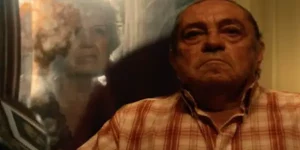
This article contains Pain Hustlers spoilers.
The opening moments of Pain Hustlers play a clever bit of reversal on audiences accustomed to watching movies “inspired by real events.” Driving a too-cool-for-school convertible across a vast southeastern bridge, Emily Blunt’s Liza Drake is introduced like many other cinematic devils. Here is a villain whose rise to a real-world throne of vice and corruption is so seductive, they’re going to spend the entire movie bragging about it to us. While Liza doesn’t quite reach the heights of Henry Hill’s opening gloats in Goodfellas—who famously began that movie by saying, “As long as I can remember, I always wanted to be a gangster”—she is plenty prideful as her voiceover announces, “Throw the first stone, sure, but this is my story. And I did it for the right reasons.”
The audience is then bombarded with contradictory information from Liza’s colleagues, accomplices, and eventual mortal enemies. Fellow drug-rep turned pharma executive Pete Brenner (Chris Evans) and a disgraced doctor (Brian d’Arcy James), who handed out her highly addictive Fentanyl wonder drug like it was a tic tac, both suggest she is as guilty as they. D’Arcy James’ Dr. Lydell even goes so far as to suggest Liza “invented me.”
For the seasoned viewer, this opening salvo of information places us in a familiar place. We are watching a story of predatory capitalism and criminality told from the perspective of the predators and perps. You should thus be entirely suspicious of everything your unreliable narrator, Blunt’s Liza, says in her own defense.
… And yet, by the end of the movie, it becomes clear what Liza said at the top of the film and throughout is true: For “the right reasons,” she became a drug rep for a company that pushed an addictive painkiller not just on cancer patients but on anyone with so much as a headache or sports injury. The men who vilified her at the beginning are the true unreliable narrators, delusional liars who projected their own greed on a single mother with a high school education who just wanted to put her sick teenage daughter in a nice house and a good school. By the end of the film, Liza is even revealed to be something of a genuinely selfless hero, going so far as to independently bring down monsters like Brennen and their company’s founder, Dr. Neal (Andy Garcia), of her own volition. She goes to the Feds without any plea deals or promises in place.
It’s a neat reversal on the movies that nakedly influenced director David Yates’ approach to Pain Hustlers. It also reveals the new Netflix movie to be far more manipulative and dishonest than any Martin Scorsese film that’s been accused of glorifying the lifestyle of monsters and mediocrities. For while Scorsese surely showed you the seductive appeal of being a gangster, or a finance bro on a decade-long trip in The Wolf of Wall Street, he never lost sight that his protagonists had made their deal with the devil… or justified all the hellfire they subsequently unleashed.
As Yates’ only second non-Harry Potter feature in the last 16 years, Pain Hustlers is a strange picture. Pulling from a nonfiction book by Evan Hughes, screenwriter Will Tovar takes inspiration from the real insidious story of Insys Therapeutics, a drug company which a little over a decade ago was paying millions of dollars to doctors in what prosecutors labeled “a kickback scheme” in order to get them to prescribe a painkiller called Subsys. And despite what Insys said about a selectively reported study, the drug turned out to be incredibly addictive.
While this is a film set after the infamous opioids crisis, it is still a modern day crucible about drugs, money, addiction, and death. But Pain Hustlers elects to be a highly fictionalized account of that story. This is presumably done in part for legal reasons. It is easier to have creative flexibility when you don’t need to know what is said behind closed doors. However, Yates has also been candid that a key reason to fictionalize the story was to create a genuinely sympathetic heroine in Liza Drake.
While speaking to Time magazine during the Toronto International Film Festival, Yates explained the rationale for making Liza a composite character of the type of reps who worked for Insys. Said the director, “It was made up of young people who were often in over their head, and they were hungry for success and a lot of that is embodied in her. Even if the details come from hither and yon, they’re real.” He went on to add, “This isn’t the Insys story in detail at all. It’s inspired by that—the fringes of that industry and how they exploit one very marginal sector of the healthcare industry and make a fortune out of it.”
In the process, Blunt (who is also an executive producer on the film) created a character with Yates and Tovar who is inspired by real details of various drug reps who worked for Insys. One woman really was an exotic dancer who got the job after a male rep drunkenly offered her a job; others were surely struggling with limited prospects due to education and circumstance. But in the fictional Liza, the filmmakers painted a perfect portrait of sympathy. Here is a smart woman in a dead-end job with a sick daughter who (ironically) needs expensive drugs just to live.
Liza gets into the wrong business for the right reasons, and at every step of her journey, she questions the morality of those around her. When the company’s founder Dr. Neal insists they need to increase growth (despite earning nearly $800 million in the previous year), she points out it is illegal to use their drug for patients not diagnosed with cancer. And when she is forced against her wishes to sell that dangerous scheme to d’Arcy James’ Dr. Lydell, she volunteers to him that she will tell her bosses he said “no” until he insists that he’ll start writing those prescriptions anyway if he can get a bigger kickback.
Everyone in this film is greedy, including Liza, but she is reluctantly so, and the movie makes great pains to insist that all other parties’ avarice far outweighs her own. The film goes so much out of its way to vindicate its protagonist that it reveals she didn’t even turn state’s evidence against her company because the Feds caught Dr. Lydell. Rather she goes to the FBI because of her own virtue and guilty conscience.
Most viewers will hopefully spot they’re being hustled with this last plot point. And the way this sob story is staged is too good to be true.
Yates’ film obviously has listened to the criticism levied at some of its cinematic influences. The Wolf of Wall Street and even Adam McKay’s far angrier and more heavy-handed The Big Short have been criticized for downplaying the pain and agony caused by their protagonists, either directly or indirectly through the system they profited from. You never once see the working class people Jordan Belfort bankrupted to pay for his yacht or pockets full of Quaaludes, and while The Big Short despises how Wall Street nearly sank the global economy in 2008, its silver lining is a bunch of rich hedge funders and analysts being smart enough to cash-in while tens of thousands of people lost their homes.
Conversely, you see at least one fictionalized patient’s journey from pain-relief to addiction with Pain Hustlers’ fictionalized drug. Yates attempts to forefront the evil of Liza’s enterprise, and if you don’t get the message, Blunt is given a scene where she is able to shout at Evans that what they did has led to peoples’ deaths! No kidding.
A movie or series about the true pervasive evil of opioids in the pharmaceutical industry can be told—see 2021’s Dopesick, as one such example. But wedding that to what Yates has called “chaotic fun” in Zanna’s boardroom (Insys by another name) is tone deaf. Yes, an executive like Evans’ character really dressed up as their company’s fatal drug spray bottle to amuse the staff during a company party, but recreating this in Pain Hustlers is meaningless. While the Scorsese scenes Yates is blatantly imitating from Wolf of Wall Street were designed to immerse the viewer into the tribal, almost cult-like mentality of excess indulged by Stratton Oakmont (and implicitly by the whole of Wall Street), it’s just an awkward detail inserted into Pain Hustlers, and long after Liza has turned state’s evidence.
Pain Hustlers isn’t chaotic or fun; it’s flat and feels like it’s deceiving itself by wanting us to sympathize with a picture-perfect drug rep who can justify profiting off the misery and literal life-and-death suffering of others. There undoubtedly were desperate people who were manipulated by the system and oblivious to what kind of drug they were selling, but that story isn’t a comedy about capitalistic overindulgence. To pretend otherwise is to actually make the insidious movie some of those Scorsese films have been accused of: a glorification of bad people doing bad things.
The post Pain Hustlers Fails Because It Wants You to Pity the Villain appeared first on Den of Geek.











